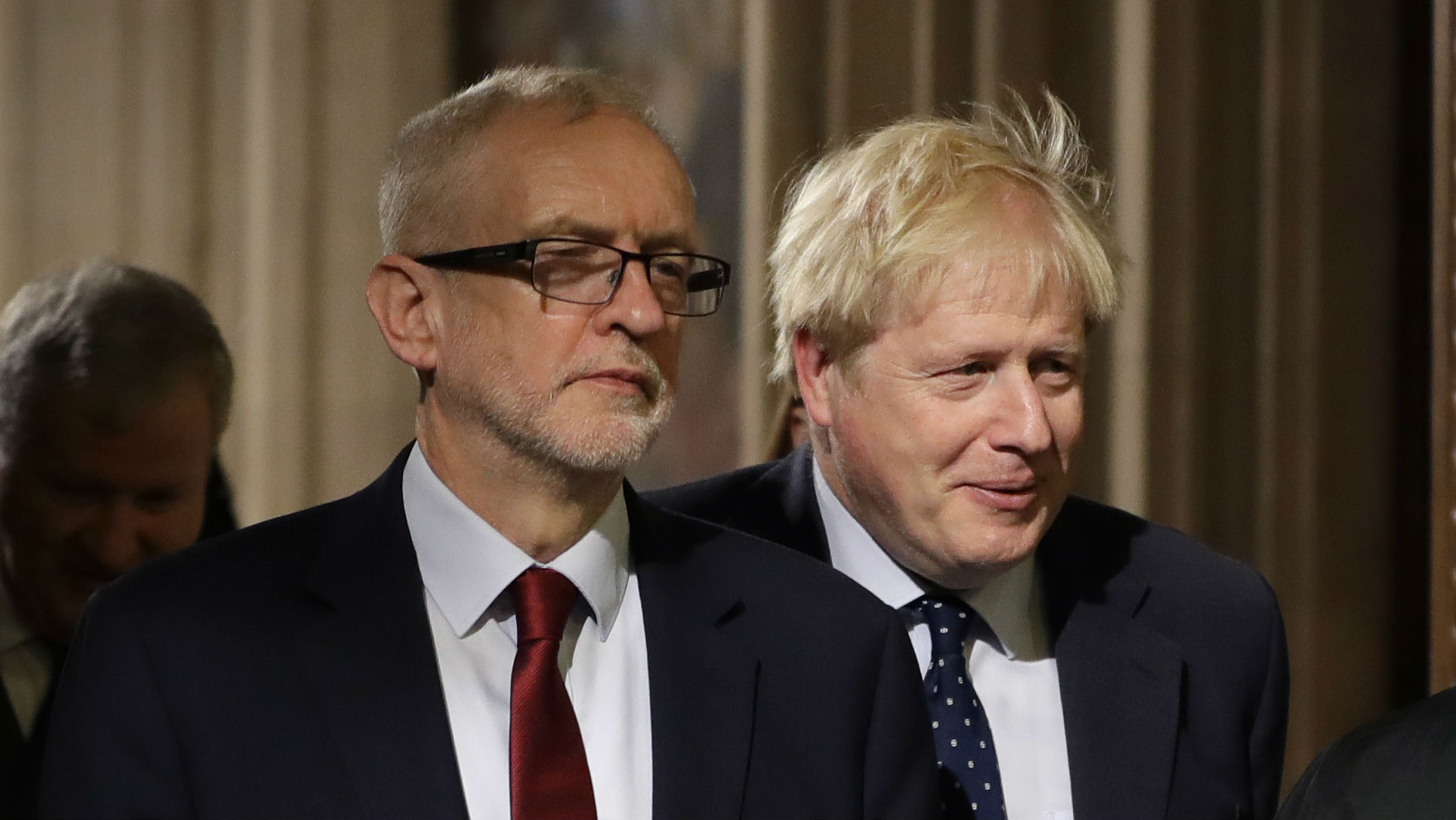Would Boris Johnson or Jeremy Corbyn resign following election defeat?
The ballot can make or break party leaders

A free daily email with the biggest news stories of the day – and the best features from TheWeek.com
You are now subscribed
Your newsletter sign-up was successful
After all the election campaign speeches, column inches and television appearances, the fates of our politicians are sealed come results day.
Previous Labour leaders Gordon Brown and Ed Miliband resigned their posts after poor election showings, while Theresa May showed us what happens when leaders do not duck out early - stumbling on despite taking a hammering at the ballot box in 2017.
Next week, we will find out what the nation makes of Boris Johnson and Jeremy Corbyn - and whether one of the two main parties be entering 2020 looking for a new leader.
The Week
Escape your echo chamber. Get the facts behind the news, plus analysis from multiple perspectives.

Sign up for The Week's Free Newsletters
From our morning news briefing to a weekly Good News Newsletter, get the best of The Week delivered directly to your inbox.
From our morning news briefing to a weekly Good News Newsletter, get the best of The Week delivered directly to your inbox.
Will Boris Johnson resign if he loses?
There are really two questions to consider here: will Johnson resign if the Conservatives lose the election and will he resign if he loses his seat?
The first issue is the clearer prospect. Johnson has billed the election as an opportunity for the British public to back his Brexit vision and give him the majority he needs to get his withdrawal agreement through the House of Commons.
As The Spectator’s political editor James Forsyth notes, that means that “if Boris Johnson wins the most votes and the most seats but not a majority, he’ll still lose office. It is all or nothing for him.”
A free daily email with the biggest news stories of the day – and the best features from TheWeek.com
Forsyth argues that the Tories “have no potential partners anymore”, with the Democratic Unionist Party unwilling to do another deal, and no majority would mean no Conservative government - and no more Johnson as prime minister.
What about if he fails to retain his seat?
The picture is slightly more cloudy if Johnson wins a majority but fails to win back his own seat, in Uxbridge and South Ruislip.
He won a 5,000 majority in 2017, but this time round pro-Corbyn activist group Momentum has “sent hundreds of activists” to campaign in the constituency and is coordinating a “targeted social media operation” aimed at swing voters, The Independent reports.
All the same, the PM is on course to hold on to his seat, according to YouGov polling.
But should that change, Johnson would have two options. The first would be to resign, triggering a leadership contest in the new Conservative government.
Keeping the keys to Downing Street would be more controversial, but not impossible. The nation’s PMs regularly sat in the House of Lords in the 18th and 19th centuries, meaning a peerage could be rushed through for Johnson. But governing from the Commons has been convention since the beginning of the 20th century.
The Conservative Party constitution says that the leader of the party “shall be drawn from those elected to Parliament”, but as the Institute for Government highlights: “How party leadership rules are interpreted might depend on the level of support the defeated prime minister retained among their MPs and party membership.”
No incumbent PM has ever lost his or her seat at a general election, but Johnson has the smallest constituency majority of any leader in recent times.
And what about Corbyn?
Labour does not look likely to win the election outright based on current polls, but might manage to get into government as the majority party in a coalition or through a voting arrangement.
According to the Daily Mail, Corbyn stepping down could be a precondition for talks between Labour and the Scottish National Party. So in the event of a hung parliament, it is not impossible that Labour could enter government without Corbyn in the top job.
But it seems unlikely that he would resign willingly after pulling off quite an impressive feat.
If Labour performs poorly, pressure will mount on Corbyn to step down after two general election loses.
However, Unite union boss Len McCluskey, a close Corbyn ally, has said that the Labour leader should stay on for a “period of reflection” if the party is not successful next week - leaving everyone guessing as to what the future will bring.
Joe Evans is the world news editor at TheWeek.co.uk. He joined the team in 2019 and held roles including deputy news editor and acting news editor before moving into his current position in early 2021. He is a regular panellist on The Week Unwrapped podcast, discussing politics and foreign affairs.
Before joining The Week, he worked as a freelance journalist covering the UK and Ireland for German newspapers and magazines. A series of features on Brexit and the Irish border got him nominated for the Hostwriter Prize in 2019. Prior to settling down in London, he lived and worked in Cambodia, where he ran communications for a non-governmental organisation and worked as a journalist covering Southeast Asia. He has a master’s degree in journalism from City, University of London, and before that studied English Literature at the University of Manchester.
-
 6 fantastic homes with fun rooms for kids
6 fantastic homes with fun rooms for kidsFeature Featuring an organic modern house in Austin and historic Chicago abode
-
 Democrats seek calm and counterprogramming ahead of SOTU
Democrats seek calm and counterprogramming ahead of SOTUIN THE SPOTLIGHT How does the party out of power plan to mark the president’s first State of the Union speech of his second term? It’s still figuring that out.
-
 Climate change is creating more dangerous avalanches
Climate change is creating more dangerous avalanchesThe Explainer Several major ones have recently occurred
-
 Can Keir Starmer save the Chagos deal?
Can Keir Starmer save the Chagos deal?Today's Big Question Opponents confident they can scupper controversial agreement as PM faces a race against time to get it over the line
-
 How corrupt is the UK?
How corrupt is the UK?The Explainer Decline in standards ‘risks becoming a defining feature of our political culture’ as Britain falls to lowest ever score on global index
-
 How long can Keir Starmer last as Labour leader?
How long can Keir Starmer last as Labour leader?Today's Big Question Pathway to a coup ‘still unclear’ even as potential challengers begin manoeuvring into position
-
 The high street: Britain’s next political battleground?
The high street: Britain’s next political battleground?In the Spotlight Mass closure of shops and influx of organised crime are fuelling voter anger, and offer an opening for Reform UK
-
 Biggest political break-ups and make-ups of 2025
Biggest political break-ups and make-ups of 2025The Explainer From Trump and Musk to the UK and the EU, Christmas wouldn’t be Christmas without a round-up of the year’s relationship drama
-
 The MAGA civil war takes center stage at the Turning Point USA conference
The MAGA civil war takes center stage at the Turning Point USA conferenceIN THE SPOTLIGHT ‘Americafest 2025’ was a who’s who of right-wing heavyweights eager to settle scores and lay claim to the future of MAGA
-
 Is a Reform-Tory pact becoming more likely?
Is a Reform-Tory pact becoming more likely?Today’s Big Question Nigel Farage’s party is ahead in the polls but still falls well short of a Commons majority, while Conservatives are still losing MPs to Reform
-
 The launch of Your Party: how it could work
The launch of Your Party: how it could workThe Explainer Despite landmark decisions made over the party’s makeup at their first conference, core frustrations are ‘likely to only intensify in the near-future’